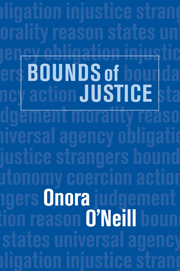Book contents
- Frontmatter
- Contents
- Preface
- Introduction
- Part I Philosophical Bounds of Justice
- 1 Four models of practical reasoning
- 2 Agency and autonomy
- 3 Principles, practical judgement and institutions
- 4 Kant's justice and Kantian justice
- 5 Which are the offers you can't refuse?
- 6 Women's rights: whose obligations?
- Part II Political bounds of justice
- Bibliography
- Index
1 - Four models of practical reasoning
Published online by Cambridge University Press: 02 December 2009
- Frontmatter
- Contents
- Preface
- Introduction
- Part I Philosophical Bounds of Justice
- 1 Four models of practical reasoning
- 2 Agency and autonomy
- 3 Principles, practical judgement and institutions
- 4 Kant's justice and Kantian justice
- 5 Which are the offers you can't refuse?
- 6 Women's rights: whose obligations?
- Part II Political bounds of justice
- Bibliography
- Index
Summary
Any convincing account of justice builds upon some conception of reason: yet the more self-consciously we think about reason, the less confident we become that we know what reason requires, or what authority those requirements have. In the daily fray of life, science and politics few of us hesitate to appeal to reason, or to comment adversely on others' lack of reasons for what they say or do. We appeal to reason as an authoritative arbiter of disputes. But when we are asked to vindicate this confidence, it ebbs. This is hardly surprising. If reason is the basis of all vindication, how can we vindicate it? Will not each attempt end in defeat – if we invoke anything unreasoned – or in circularity – if we offer only reasons?
Despite this venerable dilemma, I believe that there is much to be said about the vindication of reason. Here I am mainly concerned with the sorts of reasoning that we attempt in contexts of action, and shall have little to say about theoretical reasoning. I hope that this will not limit the inquiry as much might be surmised. For I shall assume neither that theoretical reason provides the foundations for practical reason nor that theoretical reasoning itself needs no vindication. I suspect that, on the contrary, any adequate vindication of theoretical reasoning requires a vindication of practical reasoning; but this too is more than I can make plausible here. For present purposes I shall simply bracket issues that are specific to theoretical reason, and shall consider what can be done to vindicate practical reason.
- Type
- Chapter
- Information
- Bounds of Justice , pp. 11 - 28Publisher: Cambridge University PressPrint publication year: 2000



